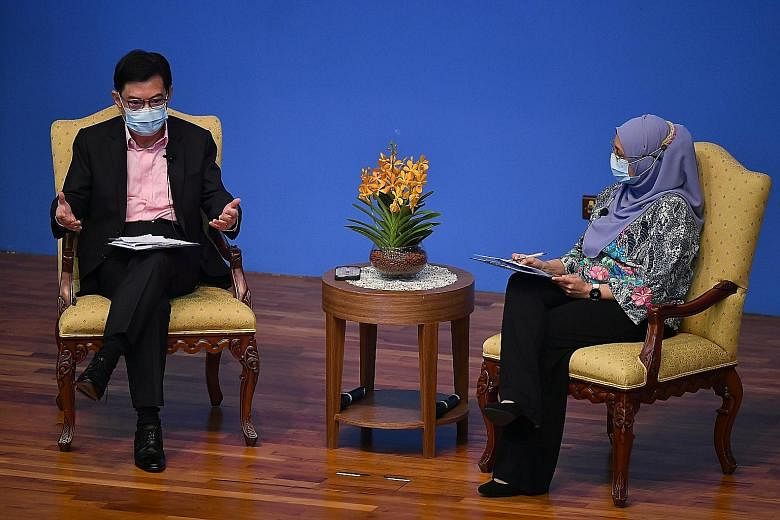As Singapore navigates the uncertain future, three strengths will buoy it up - its sense of unity, its people's creative capacity and the broader social compact forged over the years - Deputy Prime Minister Heng Swee Keat said yesterday.
But these traits are not "intrinsically enduring", he cautioned, outlining issues in each area that Singaporeans can work to improve.
"As quickly as these strengths have blossomed, they can also wither if we do not adapt," said Mr Heng. "To have a better future, we must build on these strengths, and be prepared to grow new ones."
He was speaking on shaping Singapore's future at a forum organised by the National University of Singapore (NUS) to commemorate its 115th anniversary.
On national unity, the minister stressed the importance of exercising humility and forbearance in handling differences.
This is especially the case when engaging with the deep and emotive issues of race and religion, where recent incidents have made clear that Singaporeans desire to do better as a society on this front.
But as with most social issues, there are different ideas on how progress can be made, he observed. In particular, young people - who did not experience the chaotic years of Singapore's independence and tend to be generally better educated, with more exposure to global events and trends - are more comfortable with expressing their thoughts on such issues openly on social media.
"It is useful to appreciate that we not only have different opinions on these issues, but also different ways to approach them," said Mr Heng.
This means being humble enough to recognise and correct one's biases and blind spots on matters such as race. And when people call out transgressions, they should also have the humility to not assume the worst of every action and comment, he said.
Individuals should also exercise forbearance when engaging with others on such topics, Mr Heng added. "Progress cannot be made by advocating loudly for a single viewpoint. We should instead seek out the different perspectives and expand the space for convergence," he said.
Doing so will contribute to the "precious, but fragile" unity here, which is one of the country's greatest strengths, he observed.
On the issue of creativity, Mr Heng spoke of how early generations of Singaporeans bucked conventional wisdom to forge their own paths, which helped the economy take off.
In doing so, they were open to the world - just as Singaporeans must be today. While there is room to adjust foreign manpower policies, Singapore cannot close its doors, Mr Heng said, adding that to do so only provides a false sense of security.
"We must not box ourselves into a false choice. Instead, we should both embrace openness and equip our people with the experience and skills to succeed. This is how we will thrive in a rapidly evolving world."
On Singapore's social compact, he highlighted three groups of people for whom more needs to be done. These are low-wage workers, the elderly and those with mental health issues. In each case, the wider community plays a role in helping to meet their needs, he said.
For instance, employers must help low-wage workers upskill, even as consumers must be prepared to pay a little more to improve their wages.
And every individual has a role to play in helping seniors remain actively engaged and supporting others' mental well-being, he said.
"A stronger social compact requires a collective societal effort," he said.
"We must continue to strengthen this. Increasingly, this will have to go beyond government measures and redistributive policies."
The common thread running through these three strengths is that each individual plays a role in building a better future, he added, highlighting two incidents he encountered as a young policeman.
In the first, he visited scenes affected by the 1981 Brixton riots in Britain in a reinforced vehicle, as animosity was so great that trust between the authorities and people had broken down.
In the second, he saw in the early 1980s how Japan's koban system established police officers as part of the communities they were stationed in.
"This goes beyond policing," Mr Heng said. "If relationships can be built up over time, if people care for one another, they will look out for each other, and we will have a more cohesive society."


